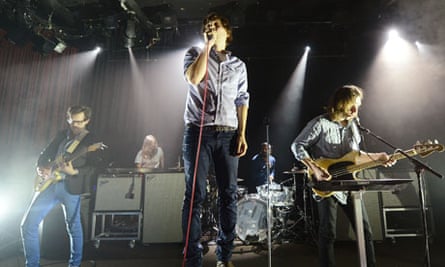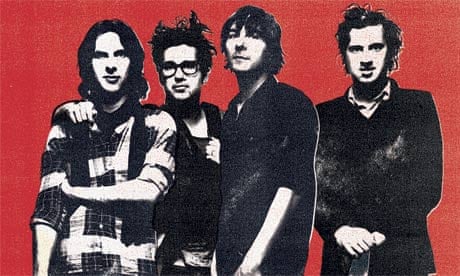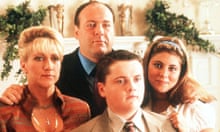Halfway through a long, rambling and enormously fun conversation with two members of Phoenix, which is taking place on the wall of a parking lot in Pomona, California, and has touched upon Indian tribes, capitalism v liberalism, the journey from an Apollonian behavioural pattern to a Dionysian one (and Beyoncé), Laurent "Branco" Brancowitz pauses. "This interview is kind of bizarre," smiles the guitarist, looking to his bandmate, Thomas Mars. "It is very bizarre," the singer nods. "I am not sure what you are going to write." He looks at Branco, who looks back to me. "Your questions are not normal. Well, … they are 'normal' but there is something insane in them." He shrugs, and returns to his train of thought: mulling over whether or not you can apply Darwinian theory to the music industry.
Two nights later, Phoenix headline the nearby Coachella festival, playing to a 50,000-strong crowd who sing along to every word of every hit, of which there are a surprising amount. Towards the end of their set, the stage goes black. There's silence, for just a little bit too long, and then a familiar voice pipes up out of the darkness. "My mind's telling me noooooo…!" Er, isn't that…? "But my body…" Can't be. "My body is telling me ye-eh-essss!" Lights up. That is R Kelly. Phoenix bring him out, and as they zip through a medley of his hits, grinning, I start to realise it's not my questions that have something insane in them but, perhaps, the people responding to them.
Phoenix have always operated with an arched eyebrow. The four friends from Versailles – Brancowitz, Mars, bassist Deck D'Arcy and guitarist Christian Mazzalai – have been making music for 20 years, and it's taken a long time for them to attain the kind of Coachella-headlining, multi-platinum success that they currently possess. But then, they wouldn't have it any other way. "We were pretty bad when we began," says Branco, matter-of-factly. "But we had very high ambitions, so there was this tension, a goal we didn't know how to reach. Some people are at their peak when they're 18, and afterwards, it's low. We are more … improving."
Mars puts this down to where they come from. "We are French. We are romantic by essence," he says. "So we are not after this rock myth, that it's [about] the youth, then it dissolves, then it's all downhill from there. I think what we want to achieve is something more complex. More gratifying. Bands like Kraftwerk, for instance. Even in movie-making, some directors reached their peak when they were 55, 60. You gather all this knowledge, then you are ready."
He adds that if YouTube had existed when the band were brand new, it would have been the death of them: "We would have made a fool of ourselves too early." Why so sure? "Because we were bad. We knew were on to something, but that's about it."
'When we talk about Bel Air, it's like the Rolling Stones talking about the Mississippi. They had no idea' – Laurent Brancowitz
That "something" has taken the band nearly two decades to hone, and you get the feeling it will always be a work in progress. Their debut album United – not bad, as it happens – made a splash after its release in 2000, in part thanks to its breakout hit, Too Young, later appearing on the soundtrack to Lost In Translation, the 2003 indie film directed by Sofia Coppola, now Mars's wife. Back then they were pegged by some as soft-rock nostalgists, artfully recreating forgotten drivetime radio gems, at a time when Foreigner and Journey were still dirty words.
The band have always denied it, of course, but it's been a steady climb to get to where they are now, and it wasn't until 2009's Wolfgang Amadeus Phoenix that they seemed to fully grow into themselves as a band. By this point, America had fallen in love with them. They were asked to headline Coachella two years ago, but refused, as they didn't want it to seem "like a victory lap". Branco raises his arms in the air and runs on the spot for emphasis. Instead, they wanted to do it when they had some new songs ready, but Phoenix albums don't come quickly. They like to spend months in the studio, messing around, "trying to create something based on pure luck", according Branco. Like jamming? "We do not jam," he asserts, with comical sternness. "Jamming? No. We do not jam. Ever."
They're finally about to release their fifth studio album, Bankrupt!, and while it's more 80s synth-heavy than previous releases, it's typically wry. With song titles such as SOS In Bel Air and Trying To Be Cool, it would appear to have an LA theme, so we ask where they made it. "Where or why?" asks Mars. Well, why is also a good question. "'Why do you bother making music?'" he teases.
"That is like asking a dolphin why it swims," smiles Branco.
Bankrupt!, it turns out, was made in New York and Paris. "To me it is a very European record," says Branco. "It's Europeans seeing the world. Our scales are always through the prism of European music, like Debussy reinventing exoticism. Even when we talk about Bel Air, it's like the Rolling Stones talking about the Mississippi. They had no idea."
The band talk about their Frenchness often, and the idea of the band as Gallic outsiders is one they play up to, at least in a live setting. "We are Phoenix, all the way from Paris, France!" Mars will yell at shows. However, right now, it feels as if French music is about to dominate the world, what with their success and the imminent return of old friends Daft Punk (with whom they started this whole thing in the first place, as the band Darlin', in the early 90s). "It is exciting that we are back at the same time," laughs Mars. "It is nice to be in this together."
They say they are thought of more warmly at home than they were at the start, when their refusal to sing in French saw multiple doors closed in their faces. "It is the position we chose," insists Mars.
"We are outsiders for sure," continues Branco, "but we do not complain. For a while it was a bit hostile in the beginning, but now we are bizarre ambassadors for some kind of French experience."
Surely, I say, this is ironic, if they have always felt like outsiders. "I think what we are doing is very French," says Mars. We cannot deny it."
He draws an analogy with the French yé-yé scene of the 60s. "There wasn't the internet at the time," he says, helpfully, "so it was easy to pick a song. All the hits – Motown, everything – they would duplicate and sing in French. They had access to the best songs in the world, and everyone thought they were written by French people, even though they would talk about jukeboxes, palm trees… "
Branco interrupts. "But I think we do the opposite of this," he says.
'These songs are not really suited [to success]! You will hear this. There are too many chords, too many sounds,' – Laurent Brancowitz

We note that there is a bright orange pop-art peach on the cover of their new album. "I think a peach is more famous in Poland," Mars suggests, straight-faced. "The research we have done with the peach … it's more Polish DNA."
"I wanted a coconut," laughs Branco. "It's true! I fought very hard for a coconut. When we started the album, they found this big treasure in India, with the biggest diamonds ever found, in a temple. Among it, there was a life-sized coconut made of pure gold."
Mars smiles, in mild disbelief. "That humanity would come this far … when you have all the resources, everything, that is what you do."
There were typically esoteric reasons that the golden coconut was ousted for the still-life peach, however. "When you have a naive ambition to do your masterpiece, the still life is the ultimate exercise," Mars explains. "Today we were watching Nile Rodgers talk about music, and you realise that when you hear him play guitar, you know it's him. We had this naive approach with the cover: that you'd see something totally random – this grey background, this neutrality and awkwardness – and it would scream 'us'." He screams, gently: "Ahhhh… "
Sceptics have already suggested Bankrupt! was written with festival sets in mind, that its huge choruses are tailored to giant crowd singalongs, and marks a deliberate move towards even bigger success. Branco is horrified: "The songs are not really suited! You will hear this. There are too many chords, too many sounds. When people say 'stadium songs', it's really negative. All the festival headliners, I've realised, are usually the worst bands."
They wouldn't tell the Guardian about the R Kelly plan at this stage – "We are afraid of tweets" – but in hindsight they must have been planning it. "Maybe our mission is to be a little bit better than that," is Branco's conclusion.
He pauses and looks at Mars: "I say that with humility. In a very humble way. Of course."
Bankrupt! is out in the UK on 22 Apr on Atlantic






Comments (…)
Sign in or create your Guardian account to join the discussion